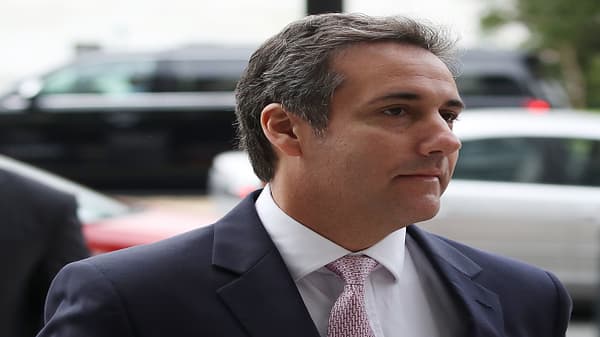Hardly. There's nothing selfless about the payment or the claim he never disclosed it to the president. Indeed, according to many who know him, there may not be a selfless bone in his body.
Even if it turns out that the payment was permanently slated to come out of Cohen's own pocket, it most likely represents an investment in his immediate future as a close ally of the man who stood days away from the presidency and also as a means of protecting and expanding his own set of Russian real estate deals.
What's more, entering into an agreement on behalf of a client without disclosing it to the client violates the code of attorney conduct.
As if to prove that his loyalty runs straight to himself, in his first public statement following the FBI's collection of his files, Cohen abandoned his tough-guy persona and praised the FBI for the politeness of its raiders.
The feeling one gets is that they must have the goods on him and he calculates that his best bet now is to cooperate with the investigation, which would make him special counsel Robert Mueller's biggest catch to date and help explain the president's sky-high anxiety over the raid.
Weighing against the decision to cooperate is the prospect that, should Cohen be successfully prosecuted for this or that, he'll ultimately be pardoned by the president, and that, by Cohen talking nicely about the FBI and exacerbating the president's concern that Cohen will flip, Trump will be pushed over the line, fire Mueller, and everyone now under suspicion will live happily ever after.
Anyway, so much for noble loyalty.
By contrast, the price of Brougham's loyalty — to the country and, in addition, to himself in provoking the King's wrath — was born of his admirable loyalty to the principle of due process for his client and his willingness to sacrifice for it.
And if you'd prefer a more contemporary version of the price of noble fidelity to the interests of those one represents, look no further than the lawyer who's holding the president and his cronies' feet to the fire as he himself endures ruthless, partisan condemnation and faces imminent, unceremonious dismissal: Robert Swan Mueller III.
We don't have to like the outcome of a case — think here O.J. Simpson or Casey Anthony — to appreciate that counsel's noble loyalty to her or his client is what stands between us and the many systems in which basic legal rights exist only on paper.
It's a lesson passed on to us as kids when we learned that John Adams, widely vilified at the time for his tenacious and largely successful representation of the eight Redcoats who fatally shot colonists in the Boston Massacre, represents a symbol of the rule of law.
Mueller's career teaches another lesson in faithfulness to the process: fidelity to principle is not an act that one performs on a particular occasion. It is, instead, a quality that is demonstrated over time — and which, over the course of his investigation, demonstrates the old adage that "no good deed goes unpunished."
It is true that, in the end, both Michael Cohen and Robert Mueller are paying high prices for their contrasting forms of client loyalty. Cohen, though, has suffered an additional and substantial loss: that of the ability to be proud of who he sees in the mirror each morning.
Commentary by Jay Sterling Silver, a law professor at St. Thomas University School of Law.
For more insight from CNBC contributors, follow
@CNBCopinion
on Twitter.




